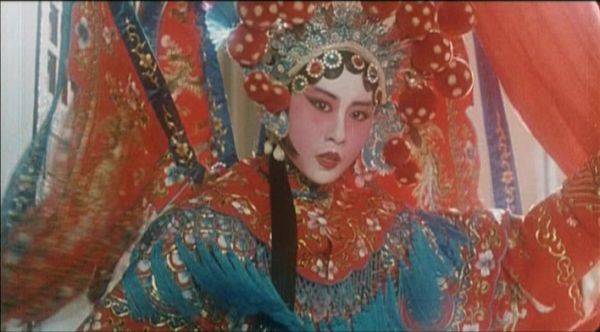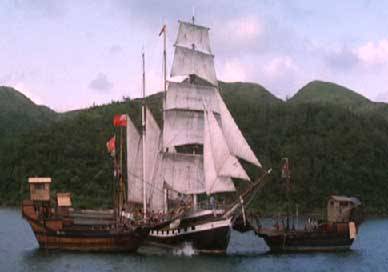 |
P.T.U. |
 |
 |
| Police Tactical Unit is a group of crack policemen called to solve critical situations such as seizures of hostages, bank robberies. It’s also the title of Johnnie To’s film: PTU. |
 |
 |
top |
 |
 |
Peking Opera |
 |
 |
The Peking Opera is a very specific opera style among the different Chinese opera styles. The Peking style was created in 1828 out of the association of two companies from Hubei and Anhui. Its repertoire includes literary plays in which singing is the main interest and war epics in which dancing and acrobatics dominate. The stories told are always inspired by Buddhist or Taoist legends, folk tales or classics of the literature. Companies perform in the streets (on platforms), at people’s homes or tea houses (some of them would become permanent theatres). Until the fall of the empire, in 1911, all the roles, even female, are played by men; it is only after that women are admitted. The gestural language (or liang xiang) is particularly complex and detailed, each movement has a precise meaning.

Cinema will regularly be inspired by opera, first by adapting on screen the most popular stories of its repertoire (Vermillion Door, Love Eterne…) then, following the popular decline of opera, by taking from the Peking Opera’s training schools its stuntmen and choreographers. In HK, there were two of them, Yu Jim Yuen’s which trained Sammo Hung, Jackie Chan, Yuen Biao, Yuen Wah, Corey Yuen, etc. and Madam Fan Fa Ko’s which trained Chin Siu Ho, Chin Kar Lok, Mars, Chung Fat, etc. Imbued with the culture of the Peking Opera, this new generation will display on screen their teaching, occasionally paying homage to their former trainings as in Prodigal Son by Sammo Hung. Despite the popular disinterest for the genre, opera will remain an interesting subject for HK film makers. Tsui Hark will thus make one of his most beautiful films in this genre with Peking Opera Blues or The Lovers (a remake of Love Eterne, itself adapted from opera), Wu Ma will direct Stage Door Johnny and even some comedies will use it as a background to their stories (The Eighth Happiness by Johnnie To).
The Peking Opera is undoubtedly part of the arts which have the most influenced HK cinema.
Arnaud Lanuque |
 |
 |
top |
 |
 |
Pinyin |
 |
 |
Most recent roman alphabet based phonetic system Develop in China during the fifties after the establishment of the Communist Republic of China, Pinyin took time to impose itself worldwide . Although it’s use is now widespread many familiar names of places or persons are still written according to the old system Wide-Giles system such as Sun Yat-sen, Chang Kai-chek etc
Written by Yves Gendron based on a original text by Matthieu Gincré. (Special contribution by Jun Wan) |
 |
 |
top |
 |
 |
Pirates |
 |
 |
 Piracy has been a great plague in the China Sea since the 17th century and mainly during the colonial era. Before being annexed by the British, the HK zone was besides a place of refuge for some pirates. Today, it has moved to the South-West of Asia but remains a major issue. The first to get interest in this subject was Jackie Chan with his Project A and its sequel. Afterwards, other films will tackle the subject such as King Of The Sea or the two Lord Of East China Sea. Contemporary piracy has, however, hardly inspired film directors, one can all the same cite as an example the very average Sea Wolves. Piracy has been a great plague in the China Sea since the 17th century and mainly during the colonial era. Before being annexed by the British, the HK zone was besides a place of refuge for some pirates. Today, it has moved to the South-West of Asia but remains a major issue. The first to get interest in this subject was Jackie Chan with his Project A and its sequel. Afterwards, other films will tackle the subject such as King Of The Sea or the two Lord Of East China Sea. Contemporary piracy has, however, hardly inspired film directors, one can all the same cite as an example the very average Sea Wolves.
Arnaud Lanuque |
 |
 |
top |
 |
 |
Pitch |
 |
 |
| English term to define a vague idea of a scenario plot. |
 |
 |
top |
 |
 |
Post synchronisation / Dubbing |
 |
 |
At the beginning, Hong Kong films were shot in 'mute' mode, which is less frequent now as shootings are more and more done in 'live sounds' (see sound effects). Then sounds and dialogues were added after editing in postproduction. Before the 70s, films were in Mandarin, but Cantonese was soon to replace the minority language in Hong Kong. However, the two languages still cohabit and that's why VCDs and DVDs are edited in both Cantonese and Mandarin on the two sound tracks. That's why in many cases an actor does not have his own voice (even in the dubbing of his own language), and the voice can differ according to the track listened to.
Regarding the dubbing made abroad (in France, Great Britain or the USA), it was given an all-out massacre at the beginning! Indeed, the distributors who bought kung fu films in the early 70s did not have much money. So, they got second-rate works and had them dubbed one after another by cheap dubbing companies which sometimes translated to their likings a story they had made up as they advanced! (Read the report in "Les Cahiers du Cinéma", Hong Kong special issue n°362-363 page 116). In this magazine, one can learn that films were sent with or without English subtitles. In the first case, they roughly translated, but in the second case, they indeed had to invent the script. Their work was so botched up that they could dub two films in a day (on the other hand, it took them a fortnight for an important American film!). A team of 4 or 5 comedians (often the same) thus dubbed all the characters of a film. As for titles, the most stupid names were invented, rarely referring to the original titles but most often totally made up for the demands of the market! The interviewed sound engineer even declared that the distributors did not hesitate in making a mess of a work by cutting its useless dialogues so as to give a boost to the whole or by shortening it in order to show two films on one programme. 30-minute reductions were even quite usual at that time! The other main problem lay in the retranscription of the films' sound worlds. Indeed, when there were dubbed dialogues, one couldn't recognize the original sound effects, especially the blows and the diverse sound effects which were the trademark of Hong Kong studios. Unfortunately, all those defects haven't improved the poor assessment of the critics and other people who might have liked this film genre. In fact, they were used and exaggerated so as to make the whacky parody Kung Pow…which is sometimes scarcely exaggerated!
|
 |
 |
top |
 |
|

|
